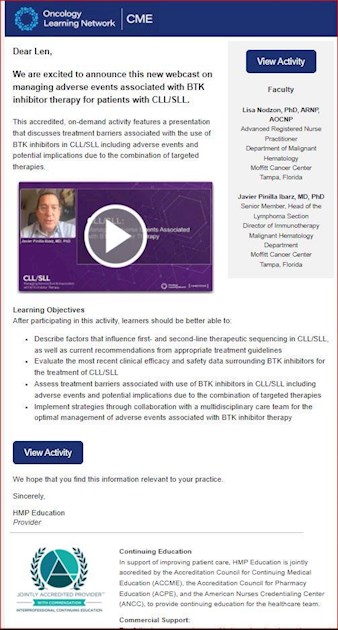This video was intended for medical professionals and is delivered as a fast paced recap of current state of the art in CLL. IMO experienced CLL patients that have moderate command of Med-speak lingo may find it useful.
-
If you are new to CLL you may want to read and follow all the links included in this Pinned Post: healthunlocked.com/cllsuppo...
instead or first.
-
Len
-
Detailed description: naccme.com/program/21-moc-5...
Video naccme.com/node/37439/cours...
-
We are excited to announce this new webcast on managing adverse events associated with BTK inhibitor therapy for patients with CLL/SLL.
-
This accredited, on-demand activity features a presentation that discusses treatment barriers associated with the use of BTK inhibitors in CLL/SLL including adverse events and potential implications due to the combination of targeted therapies.
-
Learning Objectives
After participating in this activity, learners should be better able to:
-
Describe factors that influence first- and second-line therapeutic sequencing in CLL/SLL, as well as current recommendations from appropriate treatment guidelines
-
Evaluate the most recent clinical efficacy and safety data surrounding BTK inhibitors for the treatment of CLL/SLL
-
Assess treatment barriers associated with use of BTK inhibitors in CLL/SLL including adverse events and potential implications due to the combination of targeted therapies
-
Implement strategies through collaboration with a multidisciplinary care team for the optimal management of adverse events associated with BTK inhibitor therapy
-
Lisa Nodzon, PhD, ARNP, AOCNP
Advanced Registered Nurse Practitioner
Department of Malignant Hematology
Moffitt Cancer Center
Tampa, Florida
-
Javier Pinilla Ibarz, MD, PhD
Senior Member, Head of the Lymphoma Section
Director of Immunotherapy
Malignant Hematology Department
Moffitt Cancer Center
Tampa, Florida
